
Cities of the American Heartland
Music cities from Chicago to New Orleans
About-the-USA.com
- Main
menu ►
- Life and
institutions
- Tourism & travel
- Places
About-the-USA.com
A guide to discovering the United States
A guide to discovering the United States
Cities - 3. The American Heartland
The term American Heartland means different things to different people. For some it is just the Mid West. In recent years, the term has come to be used more frequently to define the central part of the USA, covering 19 states in the Mississippi basin, an area stretching from the Great Lakes to the Gulf of Mexico that is neither the "east" nor the "west".Among the great contributions of this area to contemporary US heritage is the music that developed here and has spread worldwide, beginning with the blues whose roots lie in the center of the USA, up and down the Mississippi basin between the cities of Chicago in the north, and New Orleans in the south. And it's not just the blues that were born in this central part of the USA. Generally speaking, most of America's popular music heritage, including Jazz, rock 'n' roll and soul can be traced back to the Mississippi corridor. Even hillbilly music and country and western developed in or around this wide area.
Situated 925 miles or 1500 km apart by the interstate, Chicago and New Orleans are linked by the historic "Blues highway". US highway 61 has been much celebrated in music perhaps most famously by Bob Dylan whose album Highway 61 revisited reached worldwide audiences. The two cities are also linked by the Illinois Central railroad that has also been much celebrated in American folk music, including classic songs about the legendary Casey Jones, who died in a notorious train wreck in 1900, and the massive 1950's hit about the named train, the "City of New Orleans", which for many years ensured the longest direct daytime express train service in the USA - a 15 hour run between the two cities.
Between Chicago and New Orleans, the city of Memphis, Tennessee, is known as the birthplace of both the blues and rock 'n' roll .
Chicago,

America's third largest city, Chicago is not old. Most of the downtown area and the north side were burned to the ground in the Great Chicago Fire of October 1871. Though a disaster, the fire was also an opportunity which the city was able to turn to its advantage, as its downtown became the showcase for the new American architecture with its great invention, the skyscraper.
The great avant-garde architects of the day, Sullivan, Jenney, Frank Lloyd Wright and others, helped give Chicago a reputation that it still has to this day, as a pioneering center for the arts. Music, museums and archititecture all contribute to making this city one of the great tourist cities of North America in the twenty-first century.
Chicago's greatest music event is the Chicago blues Festival, which is the world's biggest free blues festival, with half a million visitors over three days each summer. Chicago also hosts the greatest free outdoor classical music festival in the USA, as well as the free Jazz Festival.... among its rich annual concert program. The downtown area also has over 30 live music venues for all tastes.
| Map key - Click find to locate points of interest on map | |||
| Museums & galleries | Visitable skyscrapers | ||
| Historic skyscrapers | Other points of interest | ||
Chicago's second great art gallery is the Museum of Contemporary Art,find the MCA,, founded in 1967.. One of the gretest contemporary art museums in the USA, it contains work by many living artists as well as works by established names including Warhol, Calder and Koons.
Among Chicago's other top museums are tha CAC - Chicago Architecture Center, findwhere you can learn all about he city's unique architecture, and the Field Natural History museum, findhome to some of the biggest dinosour skeletons in the world. And for those with more time to spend in the city, there are plenty more museums to discover.
Most of Chicago's main tourist attractions are in or close to the downtown area known as "the Loop". There are a number of ways to discover downtown Chicago, the best of which are to take a river cruise,find to go to the viewing deck on the 103rd floor of the Willis Tower find(Sears Tower) or on from the Chicago 360 findObservation center the 93rd floor of the former Hancock Center.. Or you can just wander round the downtown area on foot., admiring the city's historic and modern skyscrapers. While some of the iconic skyscrapers of the 19th century have been demolished to make way for newer taller brighter buildings, a few survive, such as the Delaware Building find and the Rookery find, with its hallway by Frank Lloyd Wright.
Hôtels
throughout the USA
A great selection at best rates
from Booking.com
:

Chicago:

Nashville
Memphis
Vicksburg
New Orleans
More information on : Chicago tourism official site.
Memphis
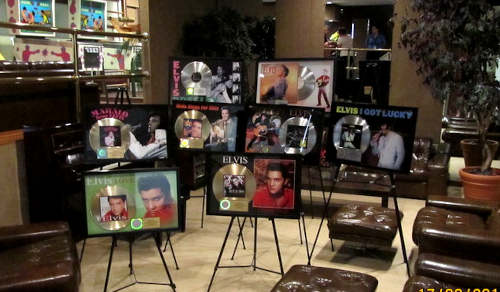 Graceland,
outside Memphis, is a mecca for fans of Elvis
Graceland,
outside Memphis, is a mecca for fans of ElvisIn downtown Memphis, Beale Street is renowned as the historic heart of the blues music scene; in fact, back in 1977, the US Congress officially designated Beale Street (photo top of page) as the "Home of the Blues". All the greats of the blues, from Muddy Waters to the Rolling Stones - who first visited Memphis in 1964 - have played in this city.
Also in downtown Memphis, the city's historic streetcars are a big attraction. The city's original streetcar system closed down way back in 1947, but the new line, using historic cars, came into service in 1993, was soon closed for safety reasons, but has been operating again along Main Street since 2014. Most of the cars operating are reconditioned vehicles purchased from locations as far away as Porto in Portugal and Melbourne, Australia.
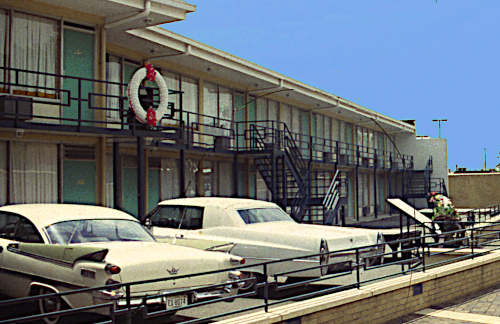 The
Lorraine Motel, in downtown Memphis.
The
Lorraine Motel, in downtown Memphis.Eight miles to the south of central Memphis stands the elegant mansion that became the home of Elvis Presley. Elvis was born in Tulepo, 100 miles southeast of Memphis, and it was at the Sun Studio, just off Beale St., that he cut his first records in 1953. Four years later, Elvis was an up and coming star, and was able to buy himself a modest mansion on the outskirts of town, Graceland. It was his home for the rest of his life, and is now the Elvis Presley museum, and the second most visited house in the USA. Elvis is buried in the gardens behind the house (though was originally buried in a cemetery in Memphis).. Next to the Graceland mansion, the "Elvis Presley's Memphis" is a suite of attractions including Elvis's collection of cars and private jets. If you're not a true Elvis fan, then you may find the entrance tickets a bit steep.
Visitors driving from Memphis to New Orleans may like to stop off half way between the two cities at Vicksburg, a small historic Southern town on the banks of the Mississippi, that was the site of a major battle in the American civil War.
Three hundred km. to the northeast of Memphis,lies Tennessee's other "music city", Nashville, the capital of country music and a major hub of the music recording business.
New Orleans
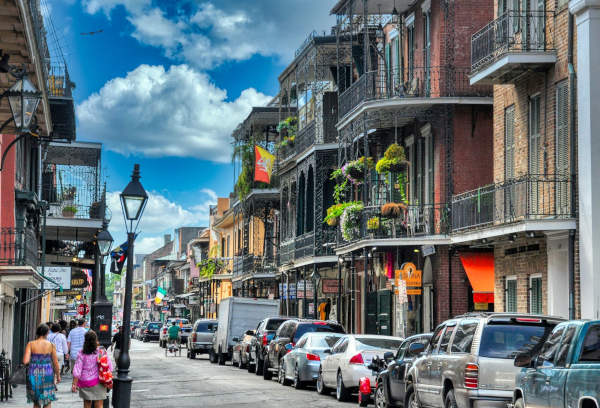
The historic center, known as Le Vieux Carré (the old square area) thus occupies a ground plan that resembles that of a medieval French bastide town. Most of the wooden buildings of the original French city of Nouvelle Orléans were razed to the ground in catastrophic fires in the late 18th century, after which the city was rebuilt rebuilt in Spanish colonial style - though still French-speaking.
Over the past three centuries, the city and the area around it have been as multicultural as any part of North America, if not more so, a unique blend of French, "Cajun" (Acadian) , Spanish, African, Caribbean and American influences.
New Orleans draws in visitors for its distinctive culture and history, for its mild winter climate, for its Carnival time (around Mardi Gras – Shrove Tuesday), and for its music.. It was here in the late nineteenth century that a new type of music, blended from a raft of popular music styles, first emerged: they called it Jazz.
New Orleans' rich cultural diversity is not reflected only in its music; the city rivals with New York for the title of gastronomic capital of the USA, its restaurants serving a huge range of cuisine inspired by the many traditions that have been blended into the fabric of the city
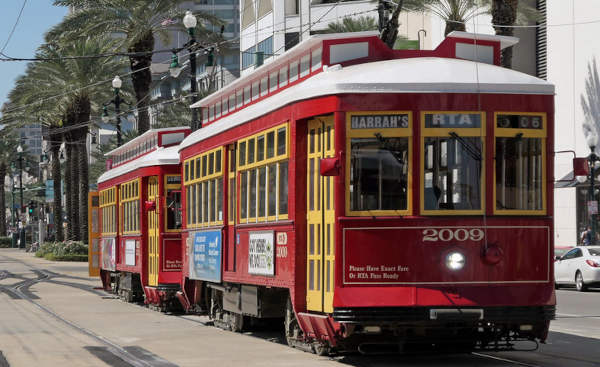 New
Orleans's iconic streetcars
New
Orleans's iconic streetcarsAmong the highlights of the NOMA is a good collection of French Impressionist art, including a canvas by Degas whose mother Célestine Musson, came from New Orleans. In 1873, Degas himself spent five months in the city, producing many paintings and drawings of his American cousins..
The other distinctive New Orleans museum is the National WWII museum, a museum of the Second World War as seen from an American perspective. With its interactive exhibits and its large collections of WW2 memorabilia, including tanks and airplanes, this is a special place to visit for anyone with an interest in this great conflict.
No stay in New Orleans can be complete without a trip on the city's iconic streetcar system. Among the five lines in operation, the St. Charles Avenue line, opened in 1835, is the world's oldest continuously-operating streetcar route. The original streetcars were horse-drawn, but as from 1893 the network was converted to electric traction
More information on : New Orleans official site.
Discover other American cities
► New York
► East coast cities from Boston to Miami
► Cities in the American West: from Seattle to Las Vegas
About-the-usa.com
Home
page
Photo top of page - Beale Street, Memphis, now officially " the home of
the Blues".
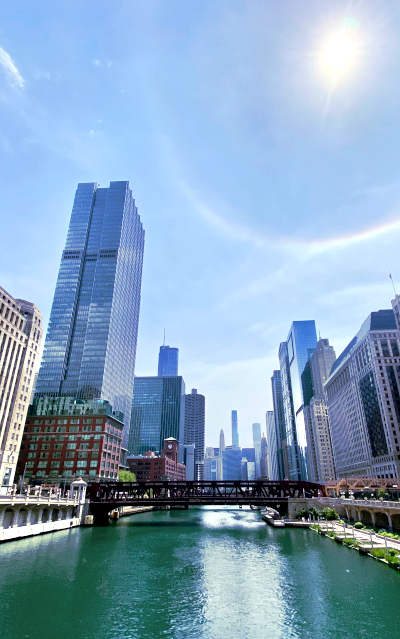
The Chicago River, bordered by the Riverwalks
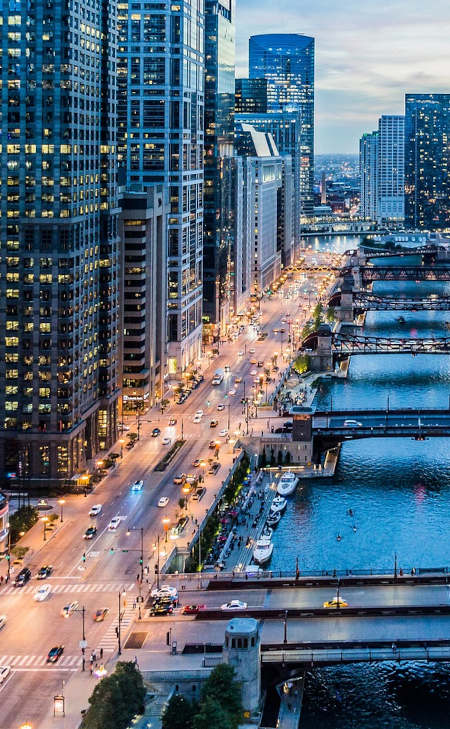
Chicago River at dusk
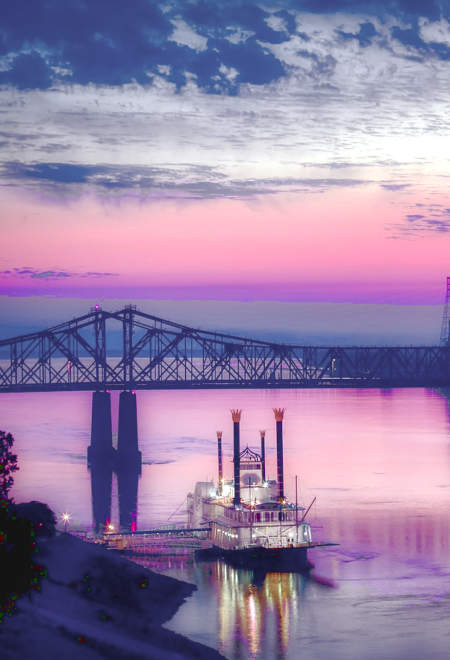
Mississippi paddlewheeler at Memphis.
Paddlewheeler cruises using Mark Twain style paddlewheelers, run up and down the Mississippi from New Orleans to Memphis and on as far as Minneapolis.
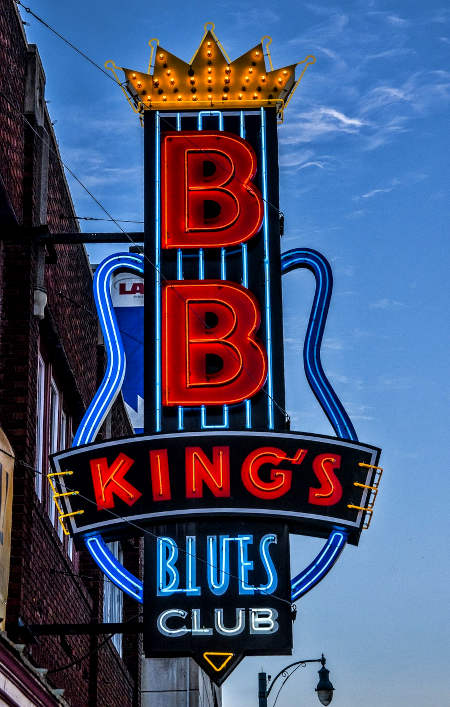
Blues club on Beale St. Memphis - one of many live music venues
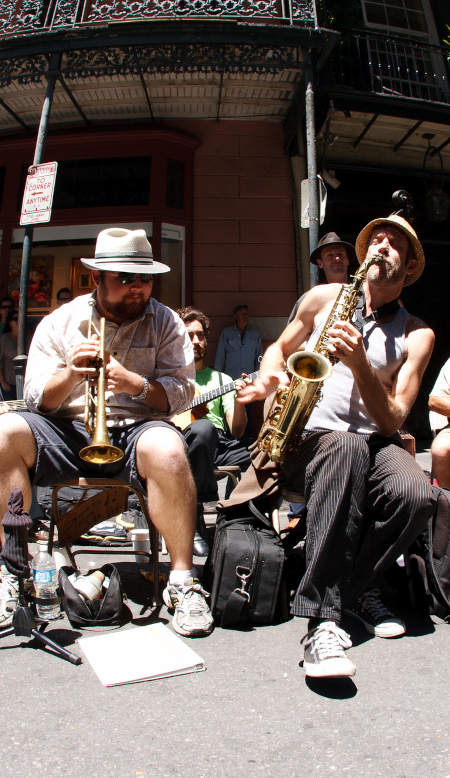
Street jazz in New Orleans
Travel and tourism
Text © About-the-usa.com
About : About-the-usa.com is a Travel-Webs site
To contact this website please use the form provided.
Photo credits.
Top of page. Memphis. Photo by Heidi Kaden
Chicago river at dusk - by Tobias Brunner
Graceland: Creative Commons 2.0 licenced photo by Ant Gorman
Lorraine Motel. © About-the-usa.com
New Orleans French Quarter - Ken Cooper
New Orleans streetcars -- Bernard Spragg
New Orleans - street jazz.- Creative Commons 2.0 photo by Edu Mousinho
Discover America
its past, its present, its future.
Read about some of the icons that have helped make the United States the place it is today... Elvis Presley, Route 66, the Skyscraper, Martin Luther King, Las Vegas.... and seventeen more articles in advanced level English

its past, its present, its future.
Read about some of the icons that have helped make the United States the place it is today... Elvis Presley, Route 66, the Skyscraper, Martin Luther King, Las Vegas.... and seventeen more articles in advanced level English
CLICK FOR DETAILS


The Chicago River, bordered by the Riverwalks

Chicago River at dusk

Mississippi paddlewheeler at Memphis.
Paddlewheeler cruises using Mark Twain style paddlewheelers, run up and down the Mississippi from New Orleans to Memphis and on as far as Minneapolis.

Blues club on Beale St. Memphis - one of many live music venues

Street jazz in New Orleans
Compare:
Partner websites
Institutions, life and tourism- About France - a thematic guide to France. Over 200 pages of information for visitors and students.
- About Britain - a thematic introduction to Britain covering institutions, life and tourism
- Angleterre.org.uk - Le guide de l'Angleterre, en français
Travel and tourism
- About Quebec - Discover the French-speaking province of Canada
- About California - a thematic travel guide to California
- About-Portugal.com - Discover Portugal and its regions
- About Spain - discover the real Spain - an incomplete guide to Spain on and off the beaten track
Text © About-the-usa.com
About : About-the-usa.com is a Travel-Webs site
To contact this website please use the form provided.
Photo credits.
Top of page. Memphis. Photo by Heidi Kaden
Chicago river at dusk - by Tobias Brunner
Graceland: Creative Commons 2.0 licenced photo by Ant Gorman
Lorraine Motel. © About-the-usa.com
New Orleans French Quarter - Ken Cooper
New Orleans streetcars -- Bernard Spragg
New Orleans - street jazz.- Creative Commons 2.0 photo by Edu Mousinho
